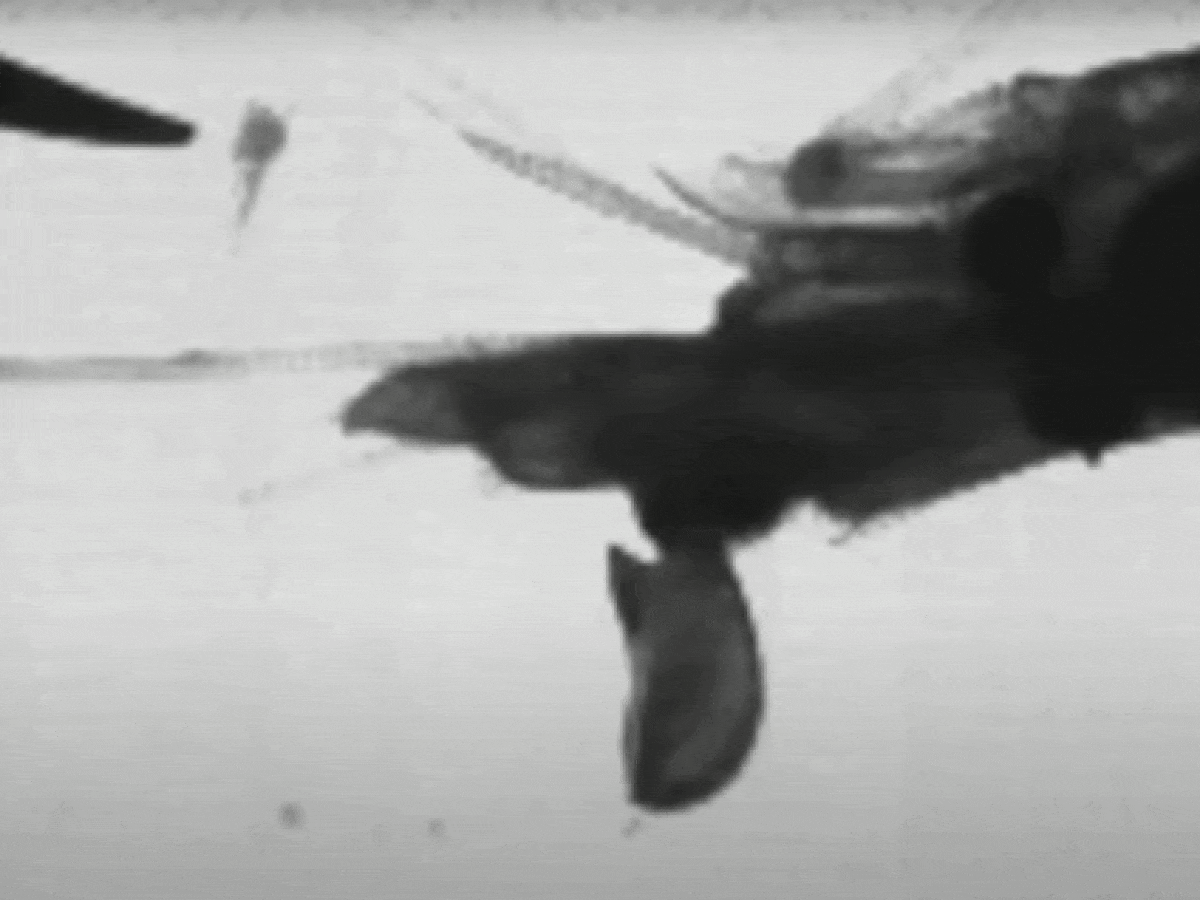Oceans
Have Any Animals Evolved to Adapt to Human Activity?
You’ve got questions. We’ve got experts
Were Scientists Duped by a Plastic Shark Toy?
Researchers withdrew a report of a rare and elusive goblin shark spotted in Greece after their peers raised concerns about the alleged discovery
The Enduring Influence of Hokusai's 'Great Wave'
A rare early print of the iconic image sold for a record-breaking $2.8 million at auction
These Flesh-Eating Bacteria Are Thriving Because of Climate Change
New research finds that infections caused by Vibrio vulnificus have increased over the last 30 years and expanded to new geographic areas
The Ambitious Plan to Stop Mice From Eating Seabirds
Conservationists want to clear Marion Island of the pests, which are wreaking havoc on albatross and other nesting species
Strong Snowstorms Prevented Tens of Thousands of Antarctic Seabirds From Breeding
With their nesting sites buried under a blanket of snow, some petrels and skuas made no attempts at reproducing in December 2021 and January 2022
The Mystery of This Petroglyph-Covered Alaskan Beach
The 8,000-year-old rock carvings were likely created by the Tlingit
A 5,000-Mile-Wide Mass of Seaweed Is Heading for Florida and Mexico
Known as sargassum, the algae can hurt tourism as it piles up on beaches and starts to rot
DNA Buried in Sediment Helps Scientists Picture Past Ecosystems
Examining the evidence offers a way to look back at now damaged environments
Meet the Man Spending 100 Days Underwater for Science
Joseph Dituri aims to set a world record, conduct research and inspire students to conserve the oceans
Toxic Red Tide Is Back in Florida—Here's What to Know
Caused by an overgrowth of algae, the blooms can be harmful to humans, pets and marine wildlife
Historic Treaty Protects Marine Life in the 'High Seas'
The United Nations agreement will help conserve 30 percent of the planet’s oceans by 2030
How Lunar Cycles Guide the Spawning of Sea Creatures
Researchers are starting to understand the biological rhythms that sync worms and corals to phases of the moon
How Vacationers on Antarctic Cruises Are Filling in Scientific Gaps
From ships and submarines, citizen scientists can access remote areas ripe for new discoveries. But does the research make up for the climate impact?
Some Whales Use a Creaky 'Vocal Fry' Voice to Find Food
Like humans, toothed whales have three vocal registers: chest, falsetto and vocal fry
These Mythical Sea Monsters May Have Been Whales With Unusual Dining Habits
Tales of creatures like the Norse “hafgufa” suggest ancient and medieval people may have seen whales trap feeding
Florida’s Love-Hate Relationship With Phosphorus
The state has mined and abused the Devil's Element for decades, and now it is increasingly fouling precious coastal waters
These Young Shrimp Can Snap Their Claws as Fast as a Speeding Bullet
Juvenile snapping shrimp can achieve the fastest acceleration of any repeatable, underwater motion by a living thing, per a new study
Seaside California City Bans Balloons in Public
Laguna Beach has joined several other cities taking aim at ocean pollution, wildlife health, power outages and wildfires
See Rare Images of Early 20th-Century Antarctic Expeditions
For the first time, hundreds of photos, lantern slides and glass plate negatives are available to the public
Page 13 of 76
:focal(448x337:449x338)/https://tf-cmsv2-smithsonianmag-media.s3.amazonaws.com/filer_public/b6/c7/b6c7aaff-117f-47bd-b498-954ca749b292/ask.jpg)
:focal(1202x893:1203x894)/https://tf-cmsv2-smithsonianmag-media.s3.amazonaws.com/filer_public/19/fa/19fab81a-5467-4c81-8d75-a64a584279c8/screen_shot_2023-03-28_at_34522_pm.png)
:focal(1170x791:1171x792)/https://tf-cmsv2-smithsonianmag-media.s3.amazonaws.com/filer_public/53/77/537730db-7f87-464f-bbfa-e377efd9030b/great-wave-scaled.jpg)
:focal(350x237:351x238)/https://tf-cmsv2-smithsonianmag-media.s3.amazonaws.com/filer_public/87/c3/87c32e68-4838-4d76-8fef-2127d08b6cc4/7815_lores.jpeg)
:focal(1536x980:1537x981)/https://tf-cmsv2-smithsonianmag-media.s3.amazonaws.com/filer_public/93/ad/93ad9fd1-81f8-4f26-8975-30c2240ca609/51513738004_092d5e9382_3k.jpg)
:focal(836x565:837x566)/https://tf-cmsv2-smithsonianmag-media.s3.amazonaws.com/filer_public/db/c8/dbc8d79e-2de8-4e9e-b378-a7c6e00462d0/15288016567_4e571ee114_o.jpg)
:focal(1061x707:1062x708)/https://tf-cmsv2-smithsonianmag-media.s3.amazonaws.com/filer_public/11/f3/11f3d666-254a-425e-9a80-277b58241aff/gettyimages-1164634807.jpg)
:focal(2925x1978:2926x1979)/https://tf-cmsv2-smithsonianmag-media.s3.amazonaws.com/filer_public/d6/8b/d68b2ddb-fb36-4948-92b4-42d7fc03b950/gettyimages-1288681815_1.jpg)
:focal(800x602:801x603)/https://tf-cmsv2-smithsonianmag-media.s3.amazonaws.com/filer_public/5c/90/5c904c0a-4d36-4b23-8610-9753ac43883e/header-uncropped_web.jpg)
:focal(700x527:701x528)/https://tf-cmsv2-smithsonianmag-media.s3.amazonaws.com/filer_public/f8/e5/f8e53317-a3f9-478a-bb1d-c8b8c3efe677/dituri.jpeg)
:focal(1500x1000:1501x1001)/https://tf-cmsv2-smithsonianmag-media.s3.amazonaws.com/filer_public/e2/f1/e2f126a6-b996-4c4c-a232-7c3792400b49/gettyimages-1234097981.jpg)
:focal(750x514:751x515)/https://tf-cmsv2-smithsonianmag-media.s3.amazonaws.com/filer_public/91/51/9151fe17-3138-41ec-95c7-9ae69a644c62/ezgif-4-7ee9e85c9e.jpeg)
:focal(800x602:801x603)/https://tf-cmsv2-smithsonianmag-media.s3.amazonaws.com/filer_public/d2/8a/d28a9303-1b11-424c-8e06-a42087e62255/coral-spawning_web.jpg)
:focal(800x602:801x603)/https://tf-cmsv2-smithsonianmag-media.s3.amazonaws.com/filer_public/64/58/645809db-ca06-4a81-acfe-00ebb89facca/sgigantea_-_mark_niesink_1.jpg)
:focal(350x213:351x214)/https://tf-cmsv2-smithsonianmag-media.s3.amazonaws.com/filer_public/ae/04/ae04a32a-a5ce-4797-b730-871d16387c2b/low-res_mr_scan_of_porpoise_head_with_two_pairs_on_phonic_lipspng.jpg)
:focal(400x240:401x241)/https://tf-cmsv2-smithsonianmag-media.s3.amazonaws.com/filer_public/1a/fd/1afdedfc-46e4-4338-af46-1f08811efd5a/mysterious-new-behavio-1.jpg)
:focal(800x602:801x603)/https://tf-cmsv2-smithsonianmag-media.s3.amazonaws.com/filer_public/31/51/315180f3-5397-4839-a449-0555d2260806/gettyimages-546295504_web.jpg)

:focal(2736x1824:2737x1825)/https://tf-cmsv2-smithsonianmag-media.s3.amazonaws.com/filer_public/a5/37/a5377aed-dfb3-44bf-89dc-6c6fe63cfa32/pexels-this-is-zun-1680638.jpg)
:focal(1500x1114:1501x1115)/https://tf-cmsv2-smithsonianmag-media.s3.amazonaws.com/filer_public/8f/d4/8fd48c8d-e530-4521-87d4-081b2413efeb/25039650_0001.jpg)